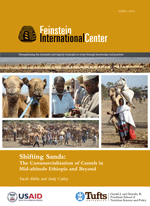Although pastoralists in Ethiopia are often characterized as unresponsive to market opportunities, the bulk of Ethiopia’s growing formal and informal livestock and meat exports are supplied from pastoralist areas of the country. This report describes a relatively new trend in pastoralist livestock marketing, being a dynamic response to increasing demand for camels in mid-altitude areas of Ethiopia, and in neighboring Sudan. In response, a camel trade network has evolved that covers about 2000km, involves more than six ethnic groups, and is served by 24 markets. Within Ethiopia, the rising demand for camels by mid-altitude farmers is associated with the drought-tolerant nature of camels and their multiple uses as pack animals, and reflects an important cultural shift among Orthodox Christians. Emerging in the absence of aid or government programs, the camel trade shows how economic synergies between pastoralist and non-pastoralist areas can develop, and provides further evidence of the market responsiveness of pastoralists, even when faced by drought and other constraints.
Shifting Sands: The Commercialization of Camels in Mid-altitude Ethiopia and Beyond

April 2011
ASSOCIATED PROJECT
SUBJECTS
PUBLICATION TYPE
LOCATION
RELATED PUBLICATIONS
This desk study explores how state-owned policies and programs in pastoral areas of the Sudano-Sahel and the Greater Horn of Africa meet pastoralists’ needs and priorities.
•
October 2024
This report outlines an anticipatory insurance product designed to support farmers in the drought-prone regions of Malawi and Zambia.
•
August 2024
The time pressure involved in designing and implementing anticipatory action can discourage the localization of decision-making. Learn more from a cartoon-infused summary of insights.
•
July 2024
Early Warning Systems can reduce deaths and damages caused by extreme weather events, if investors address gaps in communication and planning. Learn more from a cartoon-infused summary of insights.
•
July 2024
This synthesis report reflects upon Phase 1 findings on humanitarian action in pastoral drylands of the Greater Horn and Sudano-Sahel.
•
June 2024
This desk study examines common perceptions of pastoralism among humanitarians and barriers to international humanitarian systems meeting pastoralists’ needs.
•
June 2024






